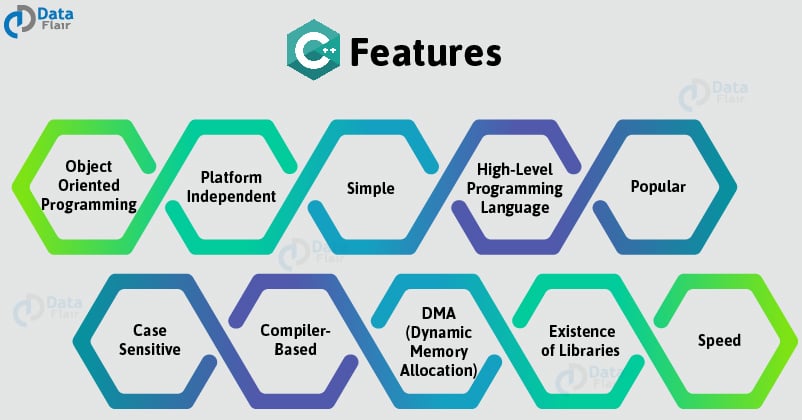Features of C++ | How Programmers use C++ in 10 Unbelievable ways
Free C++ course with real-time projects Start Now!!
C++ is quite similar to C programming. In fact, C++ supports all the features offered with C with the addition to various other important features like object-oriented programming, operator overloading, exception and error handling, the namespace feature, and many more. We can say C++ is the advanced version of C programming. Features of C++ give multiple reasons to upgrade our skills from C to C++.
It’s The Right Time To Update Your Preference
Let’s uncover the major Characteristics of C++.
Features of C++
Here are some of the remarkable features of C++ language:
1. OOP (Object-Oriented Programming)
C++ is an object-oriented language, unlike C which is a procedural language. This is one of the most important features of C++. It employs the use of objects while programming. These objects help you implement real-time problems based on data abstraction, data encapsulation, data hiding, and polymorphism. We have briefly discussed all the 5 main concepts of object-oriented programming.
The OOP concepts are:
- Data abstraction: Data abstraction is an act of representing the important features of data without including the background details or the method applied to obtain it.
- Data encapsulation: Data encapsulation is nothing but a process to implement data abstraction by wrapping up the data and functions into an exclusive block.
- Inheritance: The term inheritance refers to transferring the properties of the parent class to the child class. We can implement the basic idea of inheritance by creating more than one class, which we formally refer to as derived classes by linking them with what we call the base class. This concept reduces the redundancy of the program and makes it easy to transfer/copy the properties of one class to another
- Data hiding: Data hiding refers to protecting data from unauthorized access. It is basically responsible for securing the data. It is important to note that data encapsulation is different from data hiding as encapsulation mainly focuses on shifting the focus on important data than explaining its complex nature.
- Polymorphism: The word poly means ‘many’ and morphism means ‘forms’. Clearly, polymorphism refers to displaying that data in more than one form.
2. Platform or Machine Independent/ Portable
Although C++ is not platform-independent as compiled programs on one operating system won’t run on another operating system
But in another term, portability refers to using the same piece of code in varied environments.
Let us understand this C++ feature with the help of an example. Suppose you write a piece of code to find the name, age, and salary of an employee in Microsoft Windows and for some apparent reason you want to switch your operating system to LINUX. This code will work in a similar fashion as it did in Windows.
3. Simple
When we start off with a new language, we expect to understand in-depth. The simple context of C++ gives an appeal to programmers, who are eager to learn a new programming language.
If you are already familiar with C, then you don’t need to worry about facing any trouble while working in C++. The syntax of C++ is almost similar to that of C. Afterall C++ is referred to as “C with classes”.
4. High-level programming language
It is important to note that C++ is a high-level programming language, unlike C which is a mid-level programming language. It makes it easier for the user to work in C++ as a high-level language as we can closely associate it with the human-comprehensible language, that is, English.
5. Popular
After learning C, it is the base language for many other popular programming languages which supports the feature of object-oriented programming. Bjarne Stroustrup found Simula 67, the first object-oriented language ever, lacking simulations and decided to develop C++.
6. Case sensitive
Just like C, it is pretty clear that the C++ programming language treats the uppercase and lowercase characters in a different manner. For instance, the meaning of the keyword ‘cout’ changes if we write it as ‘Cout’ or “COUT”. Other programming languages like HTML and MySQL are not case sensitive.
7. Compiler-Based
Unlike Java and Python that are interpreter-based, C++ is a compiler-based language and hence it a relatively much faster than Python and Java.
8. DMA (Dynamic Memory Allocation)
Since C++ supports the use of pointers, it allows us to allocate memory dynamically. We may even use constructors and destructors while working with classes and objects in C++.
9. Existence of Libraries
The C++ programming language offers a library full of in-built functions that make things easy for the programmer. These functions can be accessed by including suitable header files.
10. Speed
As discussed earlier, C++ is compiler-based hence it is much faster than other programming languages like Python and Java that are interpreter-based.
Summary
Here, we shed light on the remarkable features of C++ by motivating the newbie programmers to study this language because of the features it offers, making it unique and ubiquitous. According to Tiobe index, C++ holds the 4th position. Currently, many industries are using C++ and in future, we can see many more real-time applications.
We would love to hear your experience in the comment section. Suggestions will be appreciated!
Your 15 seconds will encourage us to work even harder
Please share your happy experience on Google



c++ is platform dependent not platform independent
It’s quite encouraging and easy to use language
C++ is good for beginners. because if master, it will be easy to learn any other high level programming language.
Thanks
thanks for such useful information
Thanks for the documentation